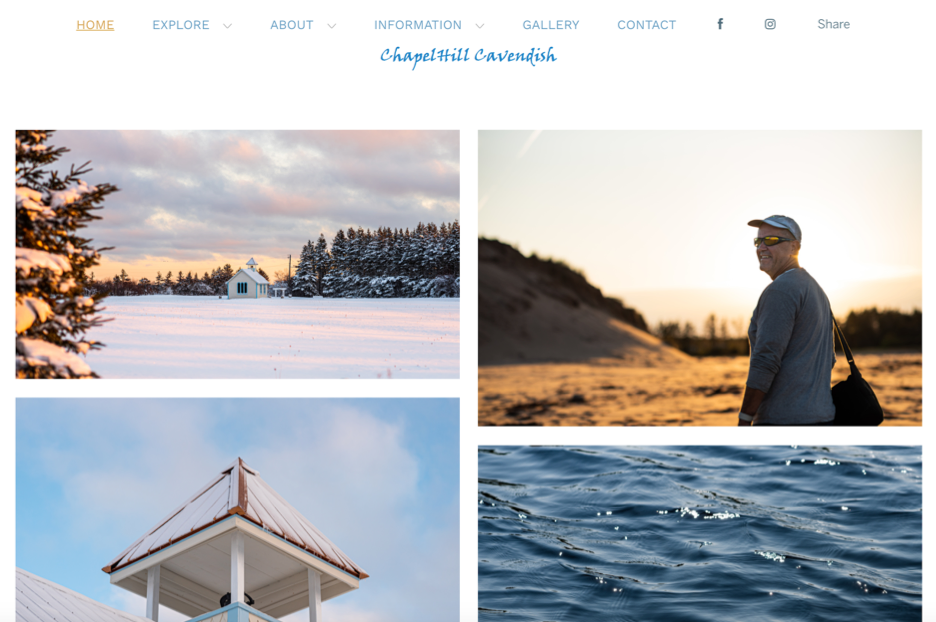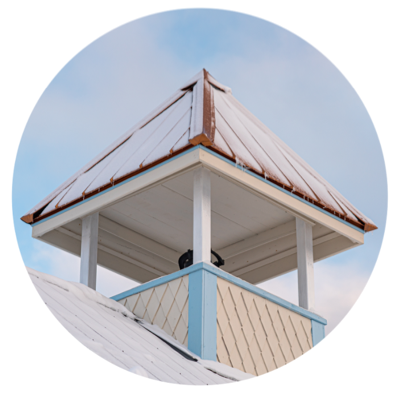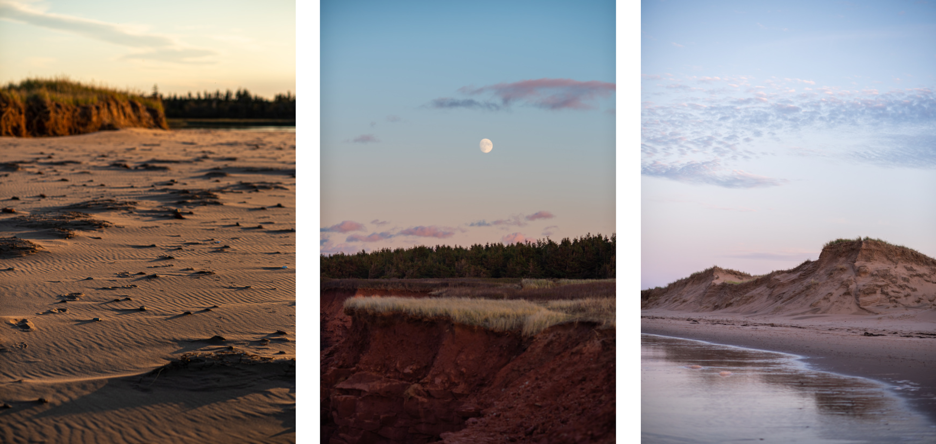Sails & Tales | An Island Business
Chapel Hill Cavendish
Sarah Davison

Introduction
This project aimed to examine what it means for entrepreneurs to develop tourism enterprises in rural communities on Prince Edward Island (PEI). Specifically, I sought to understand what these entrepreneurs construed as their goals, roles, values and challenges within their current and local conditions. This focus stems from a desire to understand sustainable, year-round economic ventures specific to small islands that enhance rural communities and specifically those that maintain a commitment to limit harm to the population, preserve ecology and celebrate island cultural and artistic lifestyles.
Shortly after completing a preliminary interview session, a global pandemic seized the nation. PEI, like the rest of the country, implemented restrictions on in-person meetings and gatherings and I realized that my project required a different approach. Thus, I decided to deepen the analysis of the first interview and complete additional work in the form of a service learning-research placement with the business, Chapel Hill Cavendish. While Chapel Hill Cavendish was originally intended as a test subject for future interviews, health limitations and the rise of global pandemic Covid-19 halted the possibility of additional interviews and in-person research. This paper is therefore a reflection on what I did and an overview/proposal of what I would do under different circumstances. The accompanying link (www.chapelhillcavendish.com) to the company website and embedded edited video of the interview provides both a revealing portrayal of an entrepreneur’s experience developing a new business in the middle of winter in rural PEI and demonstrates the tangible results of my service learning placement; namely, the completion of a fully functioning website.



Personal significance of the project
I have a personal connection to Chapel Hill Cavendish through my father who is the owner and entrepreneur, and through my own personal involvement in helping shape its creative media and marketing presence. In this unique position and given my need to be isolated with my family during the pandemic restrictions, I decided to expand and deepen the project. I reflected on the interview process and considered what a more comprehensive qualitative study would entail including an exploration of hermeneutics and mixed methods. I then explored how the photography and film components I developed might be utilized beyond the interview both as an experiential career-focused initiative and also as a much-needed digital asset for Chapel Hill Cavendish.
In effect, this project gave me the opportunity to research and learn how A/V recording, artistic displays, marketing and promotional services, and traditional research methods such as open-ended interviewing could be employed as part of a qualitative research project. The project also helped me understand how I might use my future dissertation work as a community-based collaborative research endeavor and find ways to “give back” to the people and organizations with whom I engage – perhaps using the images and video I gather to complement and enrich their digital media spaces. Thus, the project helped me to frame my future research at UPEI and served as a practical application towards helping me achieve my career goals.

Guiding research question and subsidiary questions
My research used this guiding question: What does it mean, in their own terms, for entrepreneurs to develop, maintain and grow tourism enterprises in rural Prince Edward Island? I also used several subsidiary questions to facilitate the interview process and employed a qualitative style of interviewing bringing in prompts and probes to follow and illuminate responses.
Proposed methodology and methods for further study
Given my desire to explore understanding and perception, I propose to ground my future research in hermeneutics – an interpretive approach that seeks the insightful aspects, uniqueness and commonalities of experiences and perceptions, noting their relevant contexts (Schwandt, 2000).
Methods
These are the methods I would use to conduct future research.
Literature review: Future research would begin with a thorough examination of the related literature.
Interviewee selection and interview preparation: I propose to work with the Tourism Industry Association of PEI and regional tourism offices to seek volunteers to participate in the interviews. Interviews would last 60 minutes and be recorded using video. Interviewees would be sent an invitation email explaining the format and logistics of the interview. I would also send interviewees a consent form and ask them to bring the signed form to the interview to review in person.
Semi-structured interviews and object elicitation: I would use a mixed-methods approach to collect data. I would employ object elicitation along with semi-structured interviews with participants to explore their understanding of what it means for entrepreneurs to develop and sustain tourism enterprises in rural communities on Prince Edward Island. The interviews would be recorded both with speech-to-text software linked to an external mic, and with a video camera with an in-camera mic to ensure data security.
Follow-up reflection: Following initial data analysis, I would send the interviewees a rough cut of their respective video along with a summary of the overall preliminary themes that emerged from all of the interviews. This would give an opportunity for additional input. Interview themes would be presented in an aggregate manner.
Video and photo utilization: As a deeper exploration of the project, I would complement the interview findings and my written research with corresponding video and photography. Essentially, the process would provide a visual documentation of the research findings.
Methodology and methods – rationale
The methodology and methods described previously are relevant as I seek the insightful aspects, uniqueness and commonalities of the entrepreneurs’ understandings, noting their relevant contexts. The semi-structured interviewing method fulfills the hermeneutic requirement of remaining open to meaning while providing an interpretive space and an interview structure that is responsive to the interviewee, rather than being restricted only to researcher-prepared questions and researcher prejudice (Schwandt, 2000). Further, the use of semi-structured interviews in concert with object elicitation creates an engaging interpretative framework and provides the interviewee with cues that encourage reflective responses (Wengraf, 2001). The use of follow-up reflection and video would broaden and deepen this interpretive space.

Conclusion
Many points mentioned in the interview with Chapel Hill Cavendish reveal how resiliency, imagination and hope energize at least one island entrepreneur. The challenges of nourishing spirit, securing finances, managing details, staying healthy, and articulating a vision are all reflected in the project findings. In the interest of brevity, I offer my full analysis of the interview as represented in the edited video which required the same qualitative attention to coding, theme identification and trustworthiness as would be undertaken with a written text. While I realize that this project and video are limited in providing a full portrayal of entrepreneurs working in rural PEI and I wish my personal and contextual situations were different, I take solace from a poet whom my father frequently cites when he is unsure of next steps in developing Chapel Hill Cavendish.
At worst, one is always in motion; and at best,
Reaching no absolute in which to rest,
One is always nearer by not standing still
(Gunn, 1969, p. 16)

Dedication and acknowledgements
This project is dedicated to the field of Island Studies, and to my father. Special thanks to the Institute of Island Studies at UPEI, the MAIS faculty and Department of Graduate Studies at UPEI. Thank you to Phil Davison at Chapel Hill Cavendish for his hard work and community initiatives, and for agreeing to participate in this project.
Biography
Sarah Davison is a thesis-based Island Studies Master’s Student at The University of Prince Edward Island. Inspired by her educational background in art, and career experience running a photography business, her research interests include creative island entrepreneurship and community-led tourism.
Works cited
Gunn, T. (1969). Poems 1950-1966: A selection. On the Move (pp. 16). London: Faber and Faber.
Schwandt, T. (2000). Three epistemological stances for qualitative inquiry: Interpretivism, hermeneutics, and social construction. In N. Denzin & Y. Lincoln (Eds.), Handbook of qualitative research (2nd ed., pp.189-213). Thousand Oaks, CA: Sage
Wengraf, T. (2001). Qualitative research interviewing. Thousand Oaks, CA: Sage